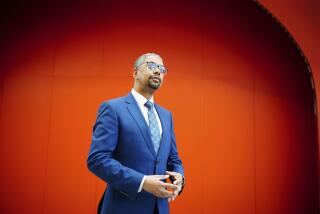Britain Witnesses American Revolution in Job Market
- Share via
LONDON — When the BBC Symphony Orchestra wanted a new leader steeped in traditional English music but also versed in more popular and contemporary works, it handed the baton to American conductor Leonard Slatkin.
In need of private funding, Oxford University’s Lincoln College searched for someone who could approach alumni unaccustomed to being asked for donations. It hired veteran American fund-raiser Alice Gosling.
And when British Airways decided to launch Go Airlines, a knockoff of the no-frills operations in the United States, it turned to Barbara Cassani--also an American.
Wherever you look in Britain these days, it seems that an American is taking charge. To the list of venerable institutions admitting executives from the United States, add the 150-year-old retailer Burberry, the Royal Opera House and the Bank of England’s Monetary Policy Committee. After U.S. giant Wal-Mart bought out one of this nation’s biggest supermarket chains, British competitor Safeway hired a former Wal-Mart executive to prepare for what promises to be an Americanized retailing revolution.
What is most amazing is not that so many Americans are being hired in Britain but that the hiring of so many Americans is scarcely raising a British eyebrow.
Britain was once an insular island with a centralized economy and a small, old-boy network. The British establishment used to purse its lips at crass American culture and at the upstart U.S. business world.
Today, that expression is more of a pucker. In New Labor’s “Cool Britannia,” it is no longer uncool to look to the United States for expertise in any field. Britain’s privatized and globalized economy is growing; openness and innovation are the buzzwords. All kinds of British institutions are looking for the best person, rather than the best Briton, to fill the job.
“In development and fund-raising, Americans are way out front. They simply don’t have enough people with the expertise here,” said Gosling, who took over as Lincoln College’s director of alumni relations last year.
Burberry, meanwhile, wanted to expand its U.S. market. “It made sense to get someone from America to look at that,” said Rose Marie Bravo, the American chief executive of the company that produces the distinctive plaid raincoats.
Of course, Britain and the United States have been the closest of allies this century, with successive leaders boasting of a “special relationship” spanning the Atlantic. The two English-speaking countries feel a cultural affinity, and there are long-standing business ties: Half of all U.S. investment in Europe is in Britain, which serves as a base for many American companies operating on the Continent.
But while average Britons have long embraced Americana, the British political elites were never quite as enthusiastic.
“The Tuscany and chablis crowd didn’t like America; the McDonald’s and Disney crowd always did,” explained Jonathan Freedland, author of “Bring Home the Revolution,” a book extolling to Britons the virtues of the U.S. political system.
Now, however, all sorts of Britons seem to have warmed to the American way.
“For Euroskeptics on the right, America is the lesser of two evils,” Freedland said. And post-Cold War, “the anti-Americanism of the old left has faded, while New Labor has signaled it is cozy with America.”
Government Has Been Called Cozy With U.S.
Prime Minister Tony Blair’s government is sometimes accused of being too enamored of the United States. Columnist Andrew Marr, writing in the Observer last month, noted that “one of the most Americanized governments of modern times” has adopted a U.S.-style New Deal, welfare-to-work programs and a tax credit for working families.
Chancellor of the Exchequer Gordon Brown, “the most public Americanizer in politics,” Marr wrote, granted the Bank of England greater independence in March 1997 after a meeting with Federal Reserve chief Alan Greenspan. Not only that, but Brown “holidays in Cape Cod.”
A softening of attitudes is evident in the left-of-center newspaper the Guardian, which might once have screamed when Slatkin, a Los Angeles native, was named in October as the first foreigner in a century to oversee the BBC’s summer music festival, a bastion of the British music world. Instead, the Guardian headline read: “He’s set to conduct the Last Night of the Proms and may be the savior of British music. Oh, and he’s American.”
In the past, many Britons might have been touchy about involving U.S. companies in sectors perceived to be part of the national patrimony, such as the London subway system. But it was not an issue when the American construction company Bechtel was called in to complete the Jubilee Line extension to the new Millennium Dome after London Transport fell so far behind schedule that it threatened to miss the once-in-a-millennium deadline for New Year’s Eve.
Likewise, scarcely a disparaging word was printed against the selection of Oregon architect Rick Mather over British and European colleagues to give a $105-million face lift to London’s South Bank arts complex on the River Thames. Except that newspapers refer to him as a “funky Los Angeles” builder--either a subtle insult, or an inability to distinguish between Oregon and the Southland.
Some Americans argue that an old naval and trading empire like Britain has always been open to outsiders and foreign capital. Just look at the British press, they say: Australian-born Rupert Murdoch owns the Times and the Sun newspapers, while Canadian Conrad Black owns the Daily Telegraph. American Marjorie Scardino has been chief executive of Pearson, the company that owns the Financial Times and the Economist, since 1997.
“There has always been a fantastic sympathy with Americans here. They like Americans,” Mather said in his London studio. “They can be quite romantic about how efficient we are and about our business practices.”
What has changed, said DeAnne Julius, one of two foreigners on the Bank of England’s nine-member Monetary Policy Committee, is simply that British companies and institutions have broadened their search for executive talent and skilled labor.
“There has been a globalization of human capability. There are more Americans and more people of other nationalities too,” Julius said. “All fields are now more global--business, the arts, sports.”
Firms Look Globally to Hire the Best
Headhunters confirm that British businesses have been looking globally in recent years and hiring more Americans, particularly in financial services, telecommunications and e-commerce firms.
“What used to happen was that people responsible for filling high-profile positions were comfortable with what was on their radar screen, with what they knew,” said Anna Mann of Whitehead Mann, a London-based executive headhunting firm.
“Now, attitudes--British or American--are more concerned with having the very best that they can get from whatever country,” she said. “Top-level searches are worldwide, and the U.S. is our main foreign market source and an integral part of our global search.”
Some headhunters and executives note that a hearty economy helps. When the country is prospering and opportunities are plenty, resentment tends to be low. They wonder if foreign executives would be as welcome in an economic slump.
Another explanation offered for Britain’s current openness to American business skills is that this nation’s consumers have become more demanding in the last few years.
“When I arrived here, there was a sense that if you pay a low price, you get what you deserve,” said Go Airlines’ Cassani, who started working for British Airways in 1987. “Today, people are demanding choices and good quality at low prices.”
Fund-Raising Skills of Americans in Demand
American-style cutbacks in government funding for the arts and education also have fueled the need for U.S. financial talent. While American hospitals, arts institutions and universities have long solicited donations, fund-raising is relatively new to Britain. Thus, the Royal Opera House brought in Michael Kaiser, formerly of the American Ballet Theater, as chief executive last year.
Cambridge University and the Massachusetts Institute of Technology announced a new partnership last month--the first of its kind in Britain--to pool resources and raise research funds from British industry. At the same time, Lincoln College is one of two Oxford colleges that employ American fund-raisers to work a suddenly competitive market for charity.
American fund-raisers say their status as outsiders can sometimes make the job easier because they are free of the class restrictions and rules of behavior that apply to Britons. They come with new ideas and are not bound by the way things have been done for centuries.
But they also encounter difficulties they do not face at home. Fund-raisers in Britain are asking people for donations to pay for benefits that their taxes used to cover. While Americans are proud and public givers, using philanthropy to establish their social position, Britons of a high social standing tend toward discretion.
“They don’t want to appear to be commercializing themselves,” said Oxford’s Gosling. “The attitude is, ‘Why would you want anyone to think you had 10,000 pounds to give?’ ”
Another difficulty is what Americans describe as unrealistic expectations.
“Sometimes they think that whatever we touch turns to gold,” Gosling said. “They hear about these multimillion-dollar endowments to Harvard but forget that more often people say no.”
On the other hand, Slatkin, the BBC’s conductor-designate, said that in his profession, “Americans have more trouble succeeding in America” because of a bias toward Europeans.
Slatkin, who is a leading expert on British music, said that when he takes over the BBC Symphony Orchestra next fall and the Proms summer music festival in 2001, he will have the opportunity to do something he has not been able to do in the United States: “Give people who don’t have means a chance to hear great music played.”
He will be the first foreigner to deliver the conductor’s speech to the Last Night at the Proms, a British institution that tends to be overtly nationalistic.
How will he manage that?
By playing “My Country ‘Tis of Thee,” of course. “I’ll say, ‘Remember, we stole ‘God Save the Queen.’ ”
More to Read
Inside the business of entertainment
The Wide Shot brings you news, analysis and insights on everything from streaming wars to production — and what it all means for the future.
You may occasionally receive promotional content from the Los Angeles Times.









